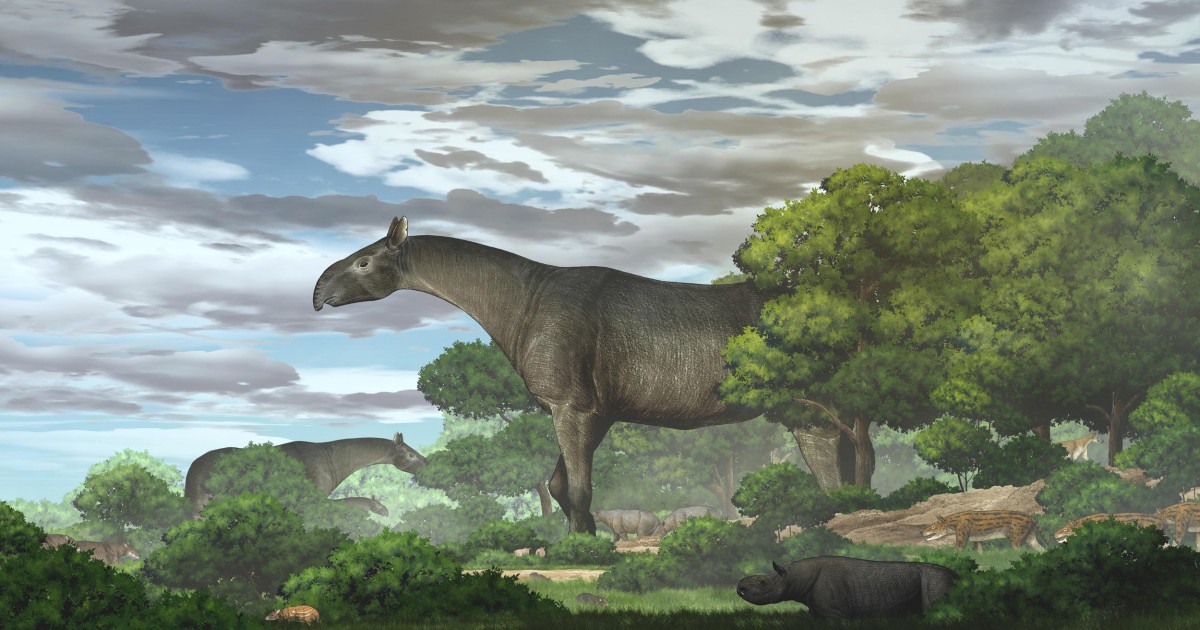
Fossils from two giant rhinos dating back about 22 million years have been unearthed in China, according to a study published Thursday.
They are among the latest relics of the gigantic animal, which was discovered amid great fanfare early last century. Much larger than modern rhinos, giant rhinos often stood more than 20 feet tall at the shoulder and weighed more than 20 tons, making them bigger than mammoths and the largest land mammal that ever lived.
The new fossils were found in May 2015 in the Linxia region of Gansu province in northwest China. One fossil consists of a skull, jawbone and teeth, and the atlas vertebra — where the head connects to the spine — while the other consists of three vertebrae.
From these remains, the scientists have reconstructed the ancient animals. And they’ve discerned enough differences in their skeletons to classify them as a new species, according to research published in the journal Communications Biology. They’ve dubbed it Paraceratherium linxiaense — the first name from its wider group of giant rhinos, and the second from the region where it was found.
Tao Deng, the director of the Institute of Vertebrate Paleontology and Paleoanthropology at the Chinese Academy of Sciences in Beijing, explained that the Linxia region has been famous for fossils since the 1950s, when local farmers there first found “dragon bones” that were used to make traditional medicines.
Deng’s team has searched for fossils in Linxia since the 1980s and discovered several complete skeletons of ancient mammals, he said in an email. But they’d only found fragments of giant rhinoceros fossils before now, although more complete fossils have been found elsewhere in China.
The new giant rhino species isn’t quite the largest — Deng said it was slightly smaller than Dzungariotherium orgosense, a species identified from fossils from China in the 1970s, but it was around a fifth larger than the relatively common Paraceratherium bugtiense, the first remains of which were identified in what’s now Pakistan in the early 1900s.
None of the giant rhinos had horns on their noses, however, although they’re the ancestors of modern rhinos: the horns they’re named after are a much later adaptation.
Giant rhinos became world famous in the 1920s after an expedition in Mongolia and China by the celebrated American explorer Roy Chapman Andrews, the model for several early Hollywood heroes.
Andrews’ team found giant rhinoceros fossils in the largely unexplored Gobi Desert and returned a fossilized skull of one beast to New York, where it went on display in the American Museum of Natural History. The discovery was such a success that giant rhinos briefly outshone even the biggest dinosaurs in the public imagination, according to historian Chris Manias of King’s College London.
Donald Prothero, a palaeontologist with the Natural History Museum of Los Angeles County and the author of a book about giant rhinos, said the immense animal was one of the last surviving giants to stalk the earth.
Although gigantic mammals were common in some earlier periods of prehistory, most died out when the climate became much drier during the Oligocene period, from about 34 to 23 million years ago, he said.
That led to the demise of the Earth’s extensive forests, and most of the mammals that relied on them for food became extinct. But giant rhinos still survived for a time.
“It was a much drier climate with lots of open turf, and trees were about the only resource that large mammals could live off,” he said. “So they would go from one stand of trees to another.”
Deng notes that the new species of giant rhino was closely related to the species in Pakistan, which raises the possibility that a close ancestor species once roamed across the Tibet region before it became the elevated plateau that it is today.
Source: | This article originally belongs to Nbcnews.com










